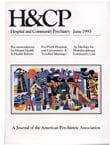An Integrative Ideology to Guide Community-Based Multidisciplinary Care of Severely Mentally Ill Patients
Abstract
Most practitioners working in community support settings understand the need to provide a comprehensive array of well-coordinated services to individuals with severe mental disabilities. However, a lack of consensus about the conceptual basis of mental health care, especially between advocates of psychosocial rehabilitation and psychiatric practitioners who favor a more medically oriented approach, has hindered efforts to optimize the effectiveness of the multidisciplinary teams found in most community support programs. The authors articulate 18 basic assumptions that have been helpful in their clinical practice in building an integrative ideology among professionals with disparate training and orientations. The assumptions attempt to balance the reality of psychiatric disorders with a fundamental interest in maintaining the autonomy and dignity of people with severe mental disorders.
Access content
To read the fulltext, please use one of the options below to sign in or purchase access.- Personal login
- Institutional Login
- Sign in via OpenAthens
- Register for access
-
Please login/register if you wish to pair your device and check access availability.
Not a subscriber?
PsychiatryOnline subscription options offer access to the DSM-5 library, books, journals, CME, and patient resources. This all-in-one virtual library provides psychiatrists and mental health professionals with key resources for diagnosis, treatment, research, and professional development.
Need more help? PsychiatryOnline Customer Service may be reached by emailing [email protected] or by calling 800-368-5777 (in the U.S.) or 703-907-7322 (outside the U.S.).



